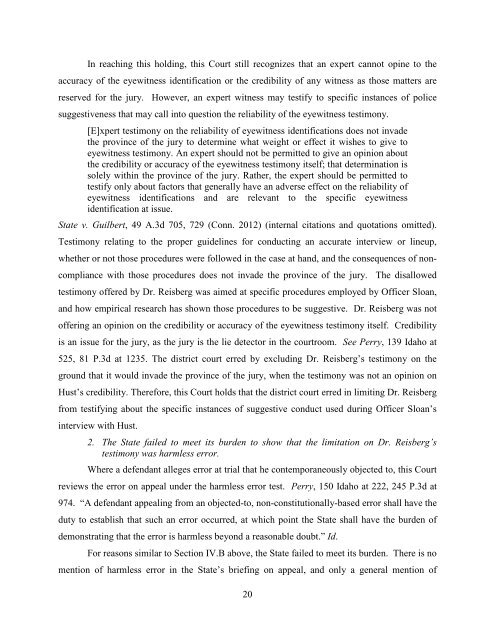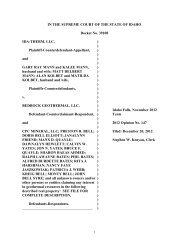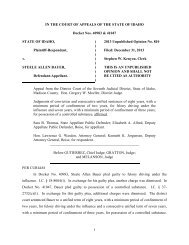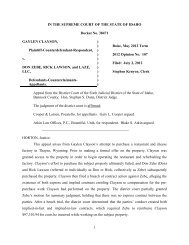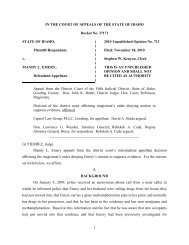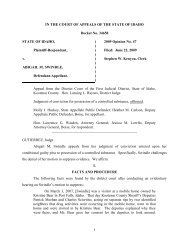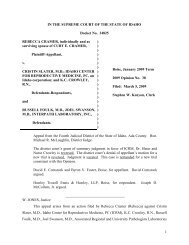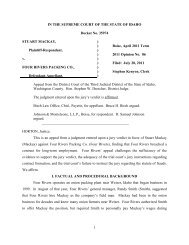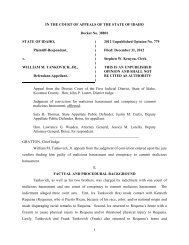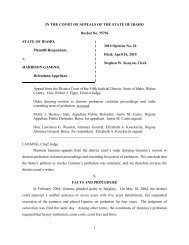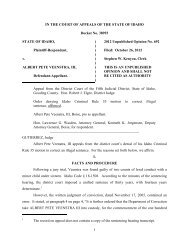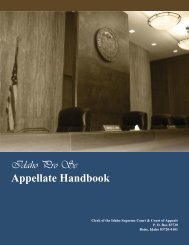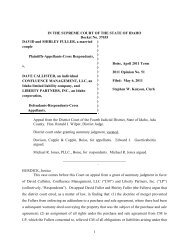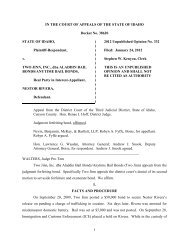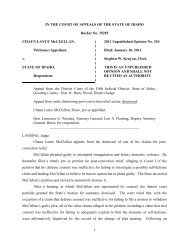April 1, 2013 State v. Hector B. Almaraz, Jr. - Idaho State Judiciary
April 1, 2013 State v. Hector B. Almaraz, Jr. - Idaho State Judiciary
April 1, 2013 State v. Hector B. Almaraz, Jr. - Idaho State Judiciary
You also want an ePaper? Increase the reach of your titles
YUMPU automatically turns print PDFs into web optimized ePapers that Google loves.
In reaching this holding, this Court still recognizes that an expert cannot opine to the<br />
accuracy of the eyewitness identification or the credibility of any witness as those matters are<br />
reserved for the jury. However, an expert witness may testify to specific instances of police<br />
suggestiveness that may call into question the reliability of the eyewitness testimony.<br />
[E]xpert testimony on the reliability of eyewitness identifications does not invade<br />
the province of the jury to determine what weight or effect it wishes to give to<br />
eyewitness testimony. An expert should not be permitted to give an opinion about<br />
the credibility or accuracy of the eyewitness testimony itself; that determination is<br />
solely within the province of the jury. Rather, the expert should be permitted to<br />
testify only about factors that generally have an adverse effect on the reliability of<br />
eyewitness identifications and are relevant to the specific eyewitness<br />
identification at issue.<br />
<strong>State</strong> v. Guilbert, 49 A.3d 705, 729 (Conn. 2012) (internal citations and quotations omitted).<br />
Testimony relating to the proper guidelines for conducting an accurate interview or lineup,<br />
whether or not those procedures were followed in the case at hand, and the consequences of noncompliance<br />
with those procedures does not invade the province of the jury. The disallowed<br />
testimony offered by Dr. Reisberg was aimed at specific procedures employed by Officer Sloan,<br />
and how empirical research has shown those procedures to be suggestive. Dr. Reisberg was not<br />
offering an opinion on the credibility or accuracy of the eyewitness testimony itself. Credibility<br />
is an issue for the jury, as the jury is the lie detector in the courtroom. See Perry, 139 <strong>Idaho</strong> at<br />
525, 81 P.3d at 1235. The district court erred by excluding Dr. Reisberg’s testimony on the<br />
ground that it would invade the province of the jury, when the testimony was not an opinion on<br />
Hust’s credibility. Therefore, this Court holds that the district court erred in limiting Dr. Reisberg<br />
from testifying about the specific instances of suggestive conduct used during Officer Sloan’s<br />
interview with Hust.<br />
2. The <strong>State</strong> failed to meet its burden to show that the limitation on Dr. Reisberg’s<br />
testimony was harmless error.<br />
Where a defendant alleges error at trial that he contemporaneously objected to, this Court<br />
reviews the error on appeal under the harmless error test. Perry, 150 <strong>Idaho</strong> at 222, 245 P.3d at<br />
974. “A defendant appealing from an objected-to, non-constitutionally-based error shall have the<br />
duty to establish that such an error occurred, at which point the <strong>State</strong> shall have the burden of<br />
demonstrating that the error is harmless beyond a reasonable doubt.” Id.<br />
For reasons similar to Section IV.B above, the <strong>State</strong> failed to meet its burden. There is no<br />
mention of harmless error in the <strong>State</strong>’s briefing on appeal, and only a general mention of<br />
20


